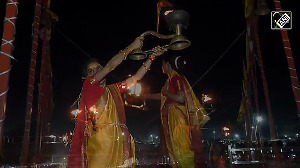That's how in common perception, foreign observers, especially in neighbouring India, have portrayed last week's developments in Pakistan.
Such a portrayal may seem appealing in our age of democracy, especially as Pakistan stands poised at the threshold of the 60th anniversary of its independence. But, like with any simplification, it overlooks the complexities of the Pakistan question.
Arguably, President Pervez Musharraf's principal audience was not even the Pakistani vox populi. Three aspects must be noted. First, Musharraf is not operating in a vacuum. He is a representative of the Pakistani establishment. All decisions are taken on behalf of the establishment.
It is entirely conceivable that at some stage if Musharraf finds himself in a cul-de-sac in the coming weeks, he may hand over power to another general.
Second, it wasn't a mere coincidence that in the shadow of the cascading speculation regarding imminent emergency rule, the Pakistan national assembly held a special four-day debate exclusively devoted to the government's foreign policy.
The salience of the debate was unmistakeable, namely, it is the popular perception of Musharraf being a subservient enforcer of American interests in the region that is in actuality eroding his legitimacy.
The national assembly's message was loud and clear when legislators with enduring links with the Pakistani establishment joined hands with the Opposition and demanded that the government should maintain open links with the Taliban; that Mullah Mohammed Omar was 'eight times more popular' than Hamid Karzai among the Afghan people; that the US and its Western allies should sit across the negotiating table with the Taliban; that the occupation forces must leave Afghanistan.
The national assembly speakers relentlessly hit the Bush administration for four full days where it hurts -- somewhere below the belt.
There was no reprieve -- not even for appearance sake.
Third, Musharraf summarily announced amidst the hullabaloo in the national assembly that he wasn't going to attend the jirga of Pashtun tribal leaders just underway in Kabul.
This was a snub to US President George W Bush who patronised the idea of the jirga, which had originated from Karzai in the first instance.
Musharraf made it clear that without his presence, the jirga would be like Hamlet without the Prince of Denmark.
The underlying message to Washington in all this was unmistakeable - 'back off'.
It goes to Washington's credit that it was quick to grasp the message. After all, Washington needlessly pushed matters too far in recent weeks.
It has been an open secret for quite a while already that the US has been attacking Pakistan's tribal areas with Hellfire missiles and Predator aircraft inflicting casualties, and all along contriving that the Pakistani army ultimately took the responsibility for it.
Last week, Islamabad asked a pertinent question: What was the need for the Rambo-like posturing by Washington in the recent weeks that the US would bomb the daylights out of Pakistani territory on the basis of 'actionable intelligence'?
Now, we may expect the Bush administration to think twice before resorting to any such grandstanding in future. The Pakistani establishment has once again underlined what the ground rules are in the 'war on terror'.
More important, there could be important fallout for Afghanistan.
Musharraf's willingness to be persuaded by US Secretary of State Condoleezza Rice to attend the Kabul jirga underscores the criticality of Pakistan's cooperation for Washington.
Rice phoned up the general twice in four hours. Washington realised there was no time to be lost.
The indications from the jirga are two-fold. First, Pakistan has taken a great leap forward in gaining international acceptability for its longstanding demand that it is only through a political accommodation with the Taliban that the 'war on terror' can be brought to a successful end.
Musharraf has completely succeeded in deflecting the jirga from its original intent of reviving the traditional tribal structure of the Pashtun communities to a 'constructive engagement' of the Taliban and its ally, the Hezb-i-Islami.
Second, Washington recognises that Pakistan's legitimate interests must be respected both in terms of the recognition of the Durand Line and in terms of the non-viability of any political set-up in Kabul that doesn't accord due recognition to Pakistan's predominant influence over Afghanistan.
Thus, the next round of the jirga to be held in Pakistan assumes much importance. It can well turn out to be a 'make or break' round.
Of course, it goes without saying that any decision by Musharraf to impose emergency rule has a grave domestic dimension to it. There are several determinants here.
First, there are signs that Benazir Bhutto is having a vague sense of uneasiness about cutting unpopular deals with Musharraf. Indeed, she faces political isolation. She must be sensing that the growing popular consensus in Pakistan is 'anti-US'.
As the veteran Pakistan People's Party leader Ghulam Mustafa Khar put it, he opposed a Musharraf-Bhutto 'deal' as she was like a daughter to him, and naturally he didn't want her to commit 'political suicide'.
Besides, Bhutto can be difficult. She is constantly reminding the general through her incessant press statements from New York that she continued to remain every bit the truculent, egotistic politician that the Punjabi-dominated Pakistani army top brass couldn't ever stand for long.
Second, Nawaz Sharif's political campaign is gaining momentum. Anything is now onward possible for Sharif. He is no longer out in the cold, no matter where he happens to be. Even the Western media have begun searching him out. There is no certainty where the powerful Choudhry clan currently ruling Punjab may eventually stand. The Islamic parties are already inclined to join Sharif.
But at the end of the day, two other factors will decisively influence the government's decision to impose emergency. First come the uncertainties engendered by an increasingly assertive judiciary. The recent actions of the court have been disconcerting for the establishment, to say the least.
The supreme court verdict on Sharif's return to Pakistan from his eight-year exile; Musharraf's continuance as the army chief; the general's eligibility to contest the presidential election; the incumbent legislative bodies' eligibility at all to elect the new president -- these are all potential trip wires in the highly volatile situation.
Second, US acquiescence with Muahrraf's plans for re-election will always remain a critical determinant.
If Karzai's strikingly demonstrative show of warmth on Sunday while greeting Musharraf at the Kabul jirga is anything to go by, Washington must be more than ever reinforced in the belief, thanks to last week's deluge of 'anti-Americanism' among Pakistan's political elite, that there is no workable alternative to Musharraf.
The British ambassador to Kabul, Sir Sherard Cowper-Coles, witnessing the jirga, couldn't have summed up equations better when he said with a stiff upper lip, 'There was a palpable sense of relief, pleasure and of history being made.'
That is to say, emergency rule still remains very much an option for Musharraf in the weeks ahead.





